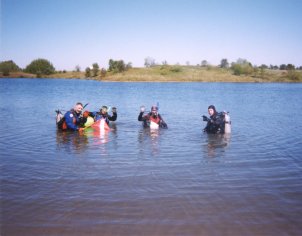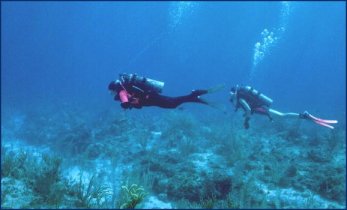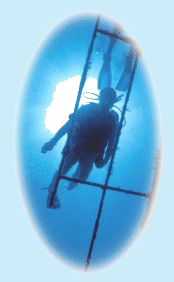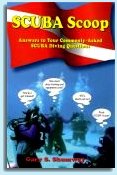Primary rule: when on a dive
boat, listen to and follow the Divemasters’ and crews’ instructions and
advice. They are there in part for your safety and to assist
you.
Use your head and not the
boat’s. If you get seasick
(see Question 62), then upchuck over the railing, down wind from everyone.
In SCUBA circles, reverse peristalsis is also termed feeding the fish.
Note that there are no fish in the boat’s head to feed. Making a
smelly, slimy mess in the lavatory is unnecessary and very bad form.
Just because it is called a head does not mean that is where yours goes.
Do not put your weights on
anything higher than what you want them to slide off of, and on to your
toes. Or worse, your neighbor’s toes! Particularly when
your neighbor is twice your size. Not only can those weights break
a toe but more importantly they could ruin the dive. If possible,
keep those weights on the boat deck under your bench or otherwise out of
the way and secure. Additionally, be sure to secure tank(s) as instructed
by the crew or Divemaster. A loose cylinder on a pitching boat can
be deadly; to everyone, including you.
One thing that many do not want
to endure is listening to that braggart who has dove everywhere, knows
it all, and damn well wants everyone to know it by loudly expounding on
how wonderful they are. Dive stories and helping other divers are
one thing, but just remember you are not the only one who paid good money
to get on that dive boat. Be considerate, it makes for a better
time for everyone.
On many dive boats, there
is a table, bench, or other spot reserved for cameras. Do not
leave open drinks in those areas. Spilling a sticky drink on a camera
or having to work on your camera in an area where some stroke has spilled
a drink is aggravating, if not expensive. Be considerate.
Another common blunder is
for some newbie to spit or put defogger in their mask and then dip the
mask in the camera rinse tank. Think about it. Underwater
cameras can easily cost thousands of dollars and repairing them is expensive,
not to mention maybe missing that shot for which someone (you?) paid good
money to dive for. If you do not know which tank is for mask rinsing
and which is for cameras, then ASK. If in doubt, do not dunk that
mask. There’s a whole ocean (see Question 15) just over the side
of the boat!
While we are talking about photography.
If you are into taking photographs, remember that once a photographer has
chosen a photo opportunity, it is theirs until they voluntarily abandon
it. Do not invade another’s photographers photo set-up!
On a dive boat there are usually
areas which are designated as dry. That does not mean you cannot
drink there. It means do not invade that area when wet. Please
dry off before entering those areas.
Tipping is a controversial
subject among some divers, but Divemasters and the boat’s crew are generally
not independently wealthy. In my opinion, it is very good form to
leave a gratuity, particularly if they have made your dive(s) go smoother
and/or more interesting. What goes around, comes around.
If at all possible, it is generally
accepted etiquette to return recovered dive gear to its owner.
Over the course of your diving, you too will lose gear and will appreciate
its return.
Touch as little as reasonably
possible when diving. Humans are tactile animals, but putting
that pinky on a blue ringed octopus could be the last less-than-brilliant
thing you do. Touching aquatic creatures can also wipe away their
protective coating of slime and leave them open to disease.
Buoyancy control is like gun
control, except instead of placement of the bullet on a target, it
is the positioning of your body in a water column. Learn how to keep
yourself and your equipment from touching marine organisms and ecologically
sensitive terrain.
Do not chase, harass, or kill
our underwater buds unless it is legal to do so and you are going to use/eat
the beast. Lobster (bugs) and shellfish in season taste great,
and are themselves a good reason to dive, but use common sense and maintain
your fishery. Shooting that huge Jew fish at a wreck may be legal
in some places, but it might also be the reason some of your compatriots
dive there. It is NOT sporting to take a fish that comes up to you
to have their belly scratched! If you take game, PLEASE take it away
from structures used for underwater sightseeing. Thank you!
Shore divers particularly take
note. Do not change into your birthday suit where you can be seen.
Even though you have a great looking, tanned body, there are shoreline
residents who would rather not see it. Beachfront residents often
have political clout (money). Keep your dive site open. Be
considerate of the local inhabitants. That includes loud noises,
particularly early in the morning, e.g., banging tanks, opening tank valves,
yelling, honking, etc. And, for heavens sake, pick up after yourselves
and do not mictrate (see Question 36) in the petunias! That really
did not have to be said, did it?




